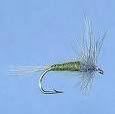Just back from two days on the "River of Screams," which is how in weak moments I refer to the Arkansas River. In the guide services brochures, the South Platte is the "Dream Stream" - I guess because the fish are so large, correspondingly dim-witted, and because it helps to have some marketing when you need to sell guide packages . . .
Average day on the South Platte
. . . whereas in the Arkansas, the fish are middling-sized, smarter than the average 10-year-old, and are what I call "entomologically specific," or (not to put too fine a point on it), "damned partiklar as concerns their diet." So more often than not I come home cursing the Trout God (which somehow I always expect will be me), the specific River God (depending on how the flow has been ordered and whether I have managed to keep my footing), numerous Insect Gods (whether for manifesting themselves or not I scarcely ever can predict), and of course the multifarious little gods and demons of wind, weather, sunlight and shadow - I generally wish the entire busload of them at the Devil.
Not on this little foray into the wilds, however. I was blessed with the kind ministrations of the entire agency of godheads, not to mention an obliging audience of Salmo trutta (fario) in the 14-17 inch class. Which is about as big as they generally get in the Arkansas, and probably why it isn't called the "River of Dreams" because who dreams of small fish (no, on second thought just ignore that).
My Salmo trutta (fario) were bigger than this
First you should know that the river begins ("finds its headwaters" as the touristic sites tell us) in the mountains above Leadville, and is fed by tributaries flowing out of the Sangre de Cristos, which have a snowpack until July 1. So I never wade without waders of some sort until maybe August, when it feels safe to walk around, with some feeling in my extremities, in my nifty no-slip water sandals:
I've never slipped in these
Then you should know that most of the river bottom is covered in boulders which may have been there, growing smoother and slicker (as have fly rods, obviously) since the Late Pleistocene . . .
No relation (with flyrod)
. . . the current is generally faster than you thought it might be, faster than it looked, than you thought your hip waders could handle, than you brought dry clothes for, than it is in Denver - remember, this is not the "Dream Stream." It can get unruly in a hurry.
River of Dreams (admittedly in the middle of Denver)
But late spring is the season of golden stone flies . . .
and little green caddis larvae . . .
both of which I had in my scraps of tackle, which I keep meticulously in a series of labeled plastic grocery bags with occasional used flies which I seem to remember tying but always look as though they were purchased by a drunken charwoman at a rummage sale . . .
"I'll just have two of the wee tiny green thingys, and a pint of vodka."
. . . and the way it's done is to tie on the larger fly (the golden stone, in this instance) to your tippet, then tie a piece of tippet on the hook bend of your first fly, tie the smaller fly (the green caddis larva) onto the trailing tippet, and then toss the mess into a current of 3-5 feet, mend the line so that the contraption floats with the water and not with the drag the current puts in your flyline, and watch the tip of your line to see if it stops unaccountably or veers off in some direction that fails to correspond with the current in which you are fishing. Any such veer or arrest in its progress generally indicates interest in your wares, in which instance you raise the tip of your rod and hope to feel some weight as it comes up.
On this foray I was able to spend the cooler mornings trailing nymphs down the current, watching my line veer this way and that, and then spend the warmer afternoons fishing alongside the current in pools and seam water with dry flies, picking off the risers with a blue-winged olive. I figure by now the Insect God must have owed me a good day.
So there I was, talking to perfect strangers who would pull over and offer me a bit of advice or a place to park my camper where the river wasn't so "overfished." I thought it was all pretty good. And today I think I'm smarter than the average 10-year-old. We'll see.









No comments:
Post a Comment